|
|
|
Sort Order |
|
|
|
Items / Page
|
|
|
|
|
|
|
| Srl | Item |
| 1 |
ID:
128428
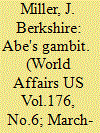

|
|
|
|
|
| Publication |
2014.
|
| Summary/Abstract |
China's aggressive actions in the East China Sea, combined with other factors, especially North Korea's continuing intransigence, have created an increasingly hostile security environment for Japan. Its response to these events can be seen in the impressive political rebirth of Shinzo Abe and the Liberal Democratic Party. While Abe, currently serving as prime minister for a second time, was elected largely because of his economic policies and the ineptitude of the formerly ruling Democratic Party of Japan, he has used his mandate to press forward with long needed, albeit controversial, defense and security reforms that indicate the seriousness with which Tokyo takes its current situation. With China looming up in front of them, and Pyongyang posing lesser but still worrisome threats, the Japanese have become acutely aware of the fact that their Self-Defense Forces (SDF) have one hundred and forty thousand ground troops, one hundred and forty-one maritime vessels, and four hundred and ten aircraft, while China's People's Liberation Army has one million six hundred thousand troops and North Korea has one million soldiers. Meanwhile, North Korea maintains a significant, if decaying, navy and air force, with one hundred and ninety vessels and approximately six hundred aircraft. China's much more capable maritime and air assets include nine hundred and seventy vessels and two thousand five hundred and eighty aircraft.
|
|
|
|
|
|
|
|
|
|
|
|
|
|
|
|
| 2 |
ID:
124321


|
|
|
|
|
| Publication |
2013.
|
| Summary/Abstract |
Starting from the empirical observation of high levels of absorption of EU cohesion funds but strikingly low levels of substantive change in regional cohesion, this essay offers a contextual analysis of regional development policies in Hungary. Based on theoretical frameworks dealing with Europeanisation, new regionalism and participative development, it explores the reasons for this observation by analysing the role of administrative and planning structures and of development discourses. The essay shows that the Europeanisation of regional development policy triggered several changes in the planning process and led to the partial inclusion of new actors. However, the main effect of this was a growing centralisation of development policy making. The essay explains this by pointing to the domestic political context and the historical foundations of regional development discourses of the conservative and leftist liberal parties. While there are overlaps between the discourses on both sides of the ideological divide, they are perceived as incompatible by political actors. Thus, it is argued that considerations of political power, rather than ideological nature, shape Hungarian regional and development policy and explain the incremental reform process.
|
|
|
|
|
|
|
|
|
|
|
|
|
|
|
|
| 3 |
ID:
131492


|
|
|
|
|
| Publication |
2014.
|
| Summary/Abstract |
Among scholars, delegation of power to the US president in 1934 is widely believed to have been a necessary requisite for tariff reductions in ensuing years. According to conventional wisdom, delegation to the president sheltered Congress from constituent pressure thereby facilitating the opening of the US economy and the emergence of the United States as a world power. This article suggests a revision to our understanding of just how that occurred. Through a close study of the US tariff schedule between 1928 and 1964, focusing on highly protected products, we examine which products were subject to liberalization and at what time. After 1934, delegation led to a change in trade policy, not because Congress gave up their constitutional prerogative in this domain but because presidents were able to target the potential economic dislocation that derives from import competition to avoid the creation of a congressional majority willing to halt the trade agreements program.
|
|
|
|
|
|
|
|
|
|
|
|
|
|
|
|
| 4 |
ID:
176863
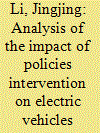

|
|
|
|
|
| Summary/Abstract |
Electric vehicles (EVs), which can relieve the pressure of energy and environment and revitalize the automotive industry, are paid great attention by the government. Existing research on the dynamic adoption process of EVs from the perspective of consumers based on complex social networks is insufficient. Based on the consumer network with dual attributes, i.e., positive/negative attitude and whether or not to adopt, this paper explores the impact of economic and information policies on EVs adoption rate by establishing a decision-making model of EVs adoption for consumers considering the effects of friend attitudes and power consumption information. The results show that: (1) The joint implementation of economic policies has a prominent effect on the adoption rate of EVs that is least affected by the subsidy cut policy when charging at home. (2) Enhancing popular science propaganda promotes the EVs adoption rate by increasing the initial proportion of positive attitudes in the consumer network. However, the promotion effect will be weakened if it exceeds a certain threshold. (3) Encouraging social discussion by expanding the number of friends has two sides to the EVs adoption rate. Finally, policymakers should consider the impact of consumers with different risk preferences on EVs adoption.
|
|
|
|
|
|
|
|
|
|
|
|
|
|
|
|
| 5 |
ID:
130610
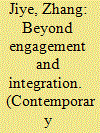

|
|
|
|
|
| Publication |
2014.
|
| Summary/Abstract |
As part of its new strategy of "retuming to the Asia-Pacific region", the A Obama administration has adopted some tough economic policies towards China, notably promoting the Trans-Paci?c Partnership (TPP) and attempting to establish new rules of international trade and investment aimed at strengthening economic ties with other Western countries through the Trans-Atlantic Trade and Investment Partnership Agreement(TTlP ), both of which tend to compress the geopolitical space for China's economic rise. The administration is also using a 'green barrier' to suppress the development of China's high-tech industry, and using economic diplomacy and investment restrictions against Chinese state-owned enterprises. This paper seeks to examine and analyze the causes of shifts in the U .S. economic strategy towards China.
|
|
|
|
|
|
|
|
|
|
|
|
|
|
|
|
| 6 |
ID:
140614
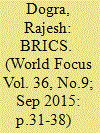

|
|
|
|
|
| Summary/Abstract |
The importance of Brazil, Russia, India, China, and, to some extent, South Africa, within the global governance structure has increased. This rise of importance is derived from the enhancement of the economic capabilities of these powers and the fact that economic interdependence has rendered the world more sensitive to the economic policies of these nations. The global financial crisis, with its detrimental effects on the global economy, was the starting point of a transformation of the global governance landscape. This fluid political and economic global environment seems to be leading to the enhancement of the position of regional powers, especially within the developing world. The more significant fact is that these emerging powers have initiated a process of conducting regular meetings for the purpose of discussing and coordinating their actions related to global issues.
|
|
|
|
|
|
|
|
|
|
|
|
|
|
|
|
| 7 |
ID:
130052


|
|
|
|
|
| Publication |
2014.
|
| Summary/Abstract |
Social protection has become part and parcel of the development response in Southeast Asia and across the globe and is likely to gain even greater prominence in light of the post-2015 development agenda. Its set of objectives has steadily widened with social protection now expected to fulfil a plethora of functions ranging from household-level consumption smoothing to macro-level economic stabilization. Notwithstanding the many achievements of social protection to date, this paper aims to inject a healthy dose of realism into current debates about its appropriate roles. This paper particularly reflects on the productivity-enhancing and growth-inducing focus within social protection - a particularly strong feature in Southeast Asia - and how this undermines principles of inclusivity, human rights and social justice. As an antidote to this Machiavellian type of social protection, this paper argues for "Inclusive Social Protection", focusing on equitable coverage, realistic expectations and better integration of policies and programmes.
|
|
|
|
|
|
|
|
|
|
|
|
|
|
|
|
| 8 |
ID:
125267
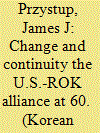

|
|
|
|
|
| Publication |
2013.
|
| Summary/Abstract |
It is important to recognize how successful the U.S.-ROK Alliance has been for the past sixty years in deterring North Korea from attempting to unify the Korean Peninsula by force. This paper addresses Korea's unique status and examines its strong presence in meeting commitments to the international community. The future will require alliance-based cooperation with international partners to address challenges posed by the proliferation of WMD, which is one among many. In the end, however, the U.S.-ROK Alliance will only grow stronger, enhancing stability and security on the Peninsula.
|
|
|
|
|
|
|
|
|
|
|
|
|
|
|
|
| 9 |
ID:
167330
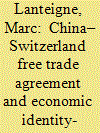

|
|
|
|
|
| Summary/Abstract |
The free trade agreement signed between China and Switzerland in 2013 was a watershed event in the economic policies of both states, a successful identity-building exercise for both actors in addition to an economic endeavour. In the case of Beijing, the Switzerland free trade agreement (FTA) was a crucial step not only in promoting its trade interests in Europe, including the European Union, but also in planning future FTAs and promoting China as a supporter of globalization and economic liberalisation. For Switzerland, the FTA further cemented that country’s identity as a distinct European economic and political actor, including in its engagement of the Chinese market.
|
|
|
|
|
|
|
|
|
|
|
|
|
|
|
|
| 10 |
ID:
124726


|
|
|
|
|
| Publication |
2013.
|
| Summary/Abstract |
Why have the negotiations of a Comprehensive Economic and Trade Agreement (CETA) between Canada and the European Union taken so long? We argue that the delay is in good part the result of a weakly designed process for intergovernmental decision making: the role for provincial and territorial governments in international trade negotiations is still too limited and does not extend to final decisions about the text of any agreement. The limited role for provinces and the fact that there is no process that requires them to formally commit to an agreement leave open the real possibility that one or more provinces could choose not to fully implement any deal that is concluded. As a result, provinces possess negotiating leverage vis-à-vis Ottawa, thereby making it difficult for the federal government to agree to the trade-offs-which are of a geographical nature in CETA's case-that are necessary for reaching a positive agreement.
|
|
|
|
|
|
|
|
|
|
|
|
|
|
|
|
| 11 |
ID:
132630


|
|
|
|
|
| Publication |
2014.
|
| Summary/Abstract |
The recent low CO2 prices in the European Union Emission Trading Scheme (EU ETS) have triggered a discussion whether the EU ETS needs to be adjusted. We study the effects of CO2 price floors and a price ceiling on the dynamic investment pathway of two interlinked electricity markets (loosely based on Great Britain, which already has introduced a price floor, and on Central Western Europe). Using an agent-based electricity market simulation with endogenous investment and a CO2 market (including banking), we analyse the cross-border effects of national policies as well as system-wide policy options.
A common, moderate CO2 auction reserve price results in a more continuous decarbonisation pathway. This reduces CO2 price volatility and the occurrence of carbon shortage price periods, as well as the average cost to consumers. A price ceiling can shield consumers from extreme price shocks. These price restrictions do not cause a large risk of an overall emissions overshoot in the long run. A national price floor lowers the cost to consumers in the other zone; the larger the zone with the price floor, the stronger the effect. Price floors that are too high lead to inefficiencies in investment choices and to higher consumer costs.
|
|
|
|
|
|
|
|
|
|
|
|
|
|
|
|
| 12 |
ID:
126690
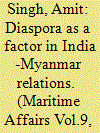

|
|
|
|
|
| Publication |
2013.
|
| Summary/Abstract |
Myanmar' is going through an unprecedented political and socio-cultural trans- formation. During the past five decades of military rule, the country witnessed supprasion of democratic norms/institutions, human rights violations, armed insurgencies by the sidelined ethnic minorities, detention of the opposition activists and leaders, especially the Nobel Peace laureate Ms Aung San Suu Kyi and the economic policies enforced by the junta, and left most of the common people impoverished, including the Indian Diaspora.
|
|
|
|
|
|
|
|
|
|
|
|
|
|
|
|
| 13 |
ID:
130977
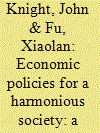

|
|
|
|
|
| Publication |
2014.
|
| Summary/Abstract |
China's remarkable economic growth has produced dramatic structural and socioeconomic change.
Economic growth has solved many problems but the accompanying changes in the economy and
society have brought new problems to the fore. This has been recognized by China's Government
in the recent emphasis that it has placed on the need to create a "harmonious society." The new
leadership will wish to devise new policies for the current challenges and those ahead
|
|
|
|
|
|
|
|
|
|
|
|
|
|
|
|
| 14 |
ID:
085849
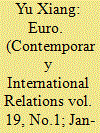

|
|
|
|
|
| Publication |
2009.
|
| Summary/Abstract |
2009 marks the 10-year anniversary of the launch of the euro, a historic undertaking which drew a veil over centuries of conflict and set Europe on an unprecedented path of cooperation and integration.
|
|
|
|
|
|
|
|
|
|
|
|
|
|
|
|
| 15 |
ID:
095026
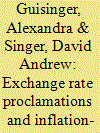

|
|
|
|
|
| Publication |
2010.
|
| Summary/Abstract |
If governments choose economic policies that often run counter to their public commitments, are those commitments meaningless? We argue that government proclamations can be critical in signaling economic policy intentions. We focus on the realm of exchange rate policy, in which countries frequently implement an exchange rate regime that differs from the officially declared regime. We argue that the official exchange rate regime is one of the most important signals of a government's economic policy preferences. When a government makes a de jure public commitment to a fixed exchange rate, it sends a signal to domestic and international markets of its strict monetary-policy priorities. In contrast, a government that proclaims a floating exchange rate signals a desire to retain discretion over monetary policy, even if it has implemented a de facto fixed rate. We use data on 110 developed and developing countries from 1974 to 2004 to test two hypotheses: first, that governments that adopt de facto fixed exchange rates will experience less inflation when they back up their actions with official declarations; and second, that governments that abide by their commitments-as demonstrated by a history of following through on their public declarations of a fixed exchange rate regime-will establish greater inflation-fighting credibility. Within developing countries, democratic institutions enhance this credibility. Results from fixed-effects econometric models provide strong support for our hypotheses.
|
|
|
|
|
|
|
|
|
|
|
|
|
|
|
|
| 16 |
ID:
137967


|
|
|
|
|
| Publication |
New Delhi, Orient Blackswan, 2015.
|
| Description |
xix, 298p.Hbk
|
| Standard Number |
9788125057741
|
|
|
|
|
|
|
|
|
|
|
|
Copies: C:1/I:0,R:0,Q:0
Circulation
| Accession# | Call# | Current Location | Status | Policy | Location |
| 058196 | 332.6730954/PAN 058196 | Main | On Shelf | General | |
|
|
|
|
| 17 |
ID:
154262


|
|
|
|
|
| Summary/Abstract |
Export growth in a country is associated with several factors including foreign direct investment that significantly contribute to faster export promotion. Since 1991, India's new economic policies have fetched more uninterrupted foreign investment than ever before. Within this framework, this paper measures the effect of foreign direct investment inflow over export promotion. Using annual data series 1991–2012, it investigates the effect of foreign direct investment on export growth in India by using co-integration statics. Results support the theory that export increases manyfold in the long run with foreign direct investment. However according to causality test reports, this is a bi-directional relationship, which suggests export and foreign direct investment are variables that mutually motivate one another.
|
|
|
|
|
|
|
|
|
|
|
|
|
|
|
|
| 18 |
ID:
133653


|
|
|
|
|
| Publication |
2014.
|
| Summary/Abstract |
Empirical research in the New Institutional Economics tradition has concentrated on the degree to which institutional constraints on rulers protect property rights and foster growth through private investment. This view of institutions is overly narrow, neglecting the role of state capacity in particular. Both state authority and constraints on rulers matter for economic performance, but the relative strength of these effects depends upon a country's distance from the frontier of the world economy. Tests using a panel data set that covers up to 84 countries from the period 1960 to 2005 reveal that, in countries that have low Gross Domestic Product (GDP) per capita, constraints on rulers in the form of checks and balances affect neither the rate of productivity growth nor the growth of capital stock per worker. Basic state authority, however, has a strong, positive effect on both of these outcomes. The story is different for advanced industrial economies, where the effects of checks are positive, especially with respect to productivity growth. Institutional checks on rulers are thus not an agent of investment-based growth but support continued growth based upon innovation at the leading edge.
|
|
|
|
|
|
|
|
|
|
|
|
|
|
|
|
| 19 |
ID:
091476
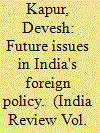

|
|
|
|
|
| Publication |
2009.
|
| Summary/Abstract |
The early decades of India's independence were characterized by a broad engagement in international affairs, with the country taking a leadership role in international organizations and regimes. This diplomatic internationalism contrasted starkly with India's autarchic economic policies, as the country became more economically insular in its first decades. The growing mismatch between India's ambitions to be a major actor in global affairs and its declining economic influence had become evident by the 1980s.
|
|
|
|
|
|
|
|
|
|
|
|
|
|
|
|
| 20 |
ID:
131001
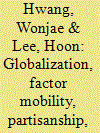

|
|
|
|
|
| Publication |
2014.
|
| Summary/Abstract |
This paper examines the relationship between economic globalization, factor mobility, government partisanship, and the relative budgetary salience of two different instruments of compensation policies: social welfare spending and industrial subsidy provision. While welfare spending directly benefits labor, industrial subsidies benefit both capital owners and labor along the sectoral line. Based on both factoral and sectoral models of trade, we theoretically argue and empirically show that governments are more likely to use welfare politics as compensation policies if free trade generates class-based interests in the society, and subsidy politics if trade openness promotes industry-based interests. We also argue that the interactions of the three variables are contingent on government partisanship. When non-class-based interests are salient as a consequence of trade openness, left-wing governments are likely to focus on welfare politics while right-wing governments favor provision of subsidies. However, when class-based interests are salient, even right-wing governments behave similarly to left-wing governments, favoring welfare spending over subsidies as the key compensation policy. In the analysis of compensation policies in the OECD countries between 1980 and 2001, the test results confirm our expectation
|
|
|
|
|
|
|
|
|
|
|
|
|
|
|
|
|
|
|
|
|